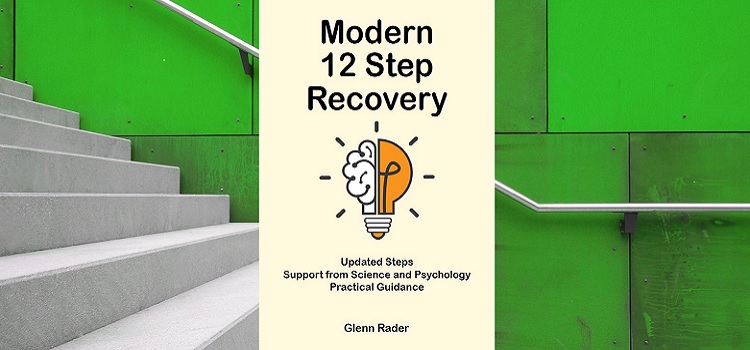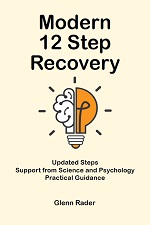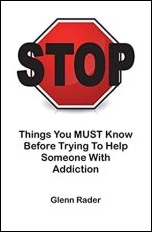Modern 12 Step Recovery

A Review by John B.
Maybe you can’t teach an old dog new tricks, but Glenn Rader has shown us you can give an old program a new look. Using a friendly and factual approach presented in an easy-to-read style, the 1938 AA antique program of recovery is analyzed from a 21st century perspective. Rader’s respect for Wilson and his program is easily detected from the outset, but like many of us in recovery, who credit our sobriety to AA participation, he takes the liberty to re-structure the 12 Steps in a manner completely devoid of any reference to God. His approach is to explain the effectiveness of the Steps in terms of widely accepted principles of psychological and physical health – a secular and humanistic approach that relies on science, not a deity.
The first two sections of the book “provide a practical perspective on addiction and the fundamentals of recovery.” (p. 4) Both topics are addressed clearly and concisely. Rader relies on the American Society of Addiction Medicine (ASAM) and the American Psychological Association (APA) for the definition of addiction. ASAM defines addiction as “a primary chronic disease of brain reward, motivation, memory, and related circuity.” (p. 6) The APA says “addiction is a chronic brain disorder with social, biological, psychological, and environmental factors influencing its development and maintenance.” (p. 6)
As a follow-up to these you’ll find mention of several dysfunctional manifestations that accompany chronic addiction and a clear description of “the path to addiction”. Rader depicts seven points along that path and even though I have now been sober well over 37 years he enabled me to visualize what I had been like at each of the points: genetics, emotional foundation, initial exposure, transitional dependency, delusional thinking and behavior, crossing the line, and living an alternative reality. These glimpses into the past gave me a sense of gratitude for the rewards sobriety has given me, and I would think this explanation of the disease concept would be useful to newcomers.
Rader specifies four fundamentals of recovery: self-direction, abstinence, physical health maintenance, and cognitive-behavioral transformation. Sticking with his clear and concise style, he gives the reader a thorough explanation of each fundamental and stresses that they are interrelated and that each one needs to be dealt with on a continual basis. This of course begs the question “just how am I supposed to do this?”
How Mr. Rader answers that question is far superior to the answers found in the chapters “How It Works” and “Into Action” in the basic text of AA. The wording of the modern 12 Steps and the single action word the author assigns to each of them conveys a much stronger message than the Big Book. That judgment is mine, not Rader’s.
It would be a mistake to look at the title of the book and to expect a harsh critique of AA. Rader sees the creation of AA as a major breakthrough, superior to the recovery programs that preceded it, but he politely curtails his praise by saying “it was a layman’s undertaking by smart, motivated, recovering alcoholics who were trying to help others with the same serious illness.” (p. 41) He does concede that the underlying principles in the 12 Steps “…are very contemporary from the standpoint of modern psychology.” (p. 41)
The modern psychology that Rader refers to is Cognitive Behavioral Therapy (CBT). He carefully explains the connection between CBT and his modern AA Steps, and stresses that it is important for the alcoholic to understand that what AA does for you is firmly grounded in modern psychology.
AA gets credit for identifying the psychic change necessary to achieve successful recovery, for devising the steps toward making the change, and for creating the mutual support network for the alcoholic to tie into. Here again the author politely separates himself from the AA pioneers and backs up his belief system with this simple statement, “Today we have the benefit of more than eighty years of research into the psychology of thinking and behavior to draw from to get a better understanding of why the 12 Step program has been effective for people.” (p. 44) In other words, science gives us the answer we seek, not divine intervention. The author devotes a major portion of the book to explain the basics of Cognitive Behavioral Therapy, the interrelationship between CBT and the Modern 12 Steps, and a detailed action plan for a sobriety seeker to follow.
This book is worthy of being added to your recovery library. Clarity and conciseness is the model. The material gives the reader the ability to see that the efficacy of the 12 Steps is solidly based on science not on a person’s ability to tap into a divine power source. The author presents a respectful and meaningful connection between “old fashioned” AA and his version of 21st century AA. This book would have been of great value to me 41 years ago when I struggled with the God question and floundered in ignorance about alcoholism. This book deserves to be used by addiction counsellors, handed to patients in treatment facilities like the Big Book was handed to me in 1980, and a place on the literature tables at meetings and at conventions.
Here’s a link to a website that includes printable and downloadable items from the book: Modern 12 Step Recovery.
The author of the review, John B, is an eighty-four year old sober alcoholic with 36 years of continuous sobriety. His alcoholism ultimately led to treatment, and eventually led to a career as an addiction counselor. John provided individual and group counseling to vets at the Marion, Indiana, V.A. hospital. He retired from the V.A. in 2001 and fondly describes it as the most challenging and satisfying job he ever had. John has also served as office manager for a major AA intergroup office in Ft. Wayne, Indiana for six and a half years. John reads 20 to 25 books a year, and three or four quality periodicals on a regular basis; mostly about politics, economics, science, history: about anything going on in the world that strikes his curiosity.
 Glenn Rader is an accomplished business professional with a background in organization development and an MBA from the University of Michigan. He is in successful recovery from alcohol and drug addiction and is a public speaker, author, and a resource in the addiction recovery community. Glenn is also the author of the book STOP – Things You Must Know Before Trying to Help Someone with Addiction. The book is the product of his work with families and friends of addicts at a major addiction treatment centre.
Glenn Rader is an accomplished business professional with a background in organization development and an MBA from the University of Michigan. He is in successful recovery from alcohol and drug addiction and is a public speaker, author, and a resource in the addiction recovery community. Glenn is also the author of the book STOP – Things You Must Know Before Trying to Help Someone with Addiction. The book is the product of his work with families and friends of addicts at a major addiction treatment centre.

























It’s fun to fantasize about a total rewrite of the Bigga Booka but it’s difficult to imagine us coming to an agreement on the content. We secularists are a diverse and opinionated lot. We can spare the worry — there will be no rewrite. The World Wide Web has provided anyone interested with a broad view of the recovery community. The vast majority see proposals to alter the text as sacrilegious, and dangerous.
Effective diversification is well underway as books like Glenn’s are being produced and distributed. There are a variety of such efforts, and “Modern 12-Step Recovery” sounds like a good one. Thanks to John B. for the clearly articulated review and for his many other contributions to this website and to secular recovery as a whole.
We have an ongoing 12 Step meeting on Wednesday night in Langley B.C. We initially used the “The Alternative 12 steps” book and then “Staying Sober Without God”. We have just started our third cycle thru using these two books. The new book “Modern 12 Step Recovery” will be a great choice for our group to use.
We are listed as a “Secular 12 Step group” in the local directory but we get some traditional AA members because they like the books and meaty discussions.
No changes to existing AA literature will achieve what the new books give us.
Indeed, an excellent review – thanks John B.
I just checked Apple Books, and it is not listed as available through them – looks like I’ll be buying my first hardback/paper-bound book for the first time in at least the past decade and a half. Hope I can order it from my local Barnes & Noble . . .
Thank you for this and I’m definitely going to add this book to my recovery library!
OMG – Its more than about time, it’s way past time – I have been a member of AA for 40 years, sober the last 29 years in a row. I am a member of Secular AA and don’t do and haven’t done since I was 15 the “god thing”. At 20yrs sober I was composing a letter of “retirement for AA” before I got involved with Secular AA – my home. I claim to be a Recovered Alcoholic and what anyone else thinks of me or anything else is none of my business. Shalom.
The old BB is but a bit of history – I disagree with over 50% of it – yet it should be preserved (opinion) with a bit of a disclaimer. WAY more has been revealed – for me it is sacrilegious and dangerous to those yet suffering to cram the BB on them without a DISCLAIMER statement. Ya know we are not the only recovery program that works for those who work it. For me best thing Bill ever wrote was either A. Emotional Sobriety or B. what is used as the intro to the pamphlet “The ‘God’ Word”. Shalom, Fast Eddie.
Thanks for this review. It is good to see more recent developments rather than being stuck in the AA past.
Excellent review of the book, John. I agree that this will be a valuable addition to anyone’s secular AA library. I think it will also be my go-to recommendation for any newcomer to AA or those already sober but struggling with “translating” all the god stuff.